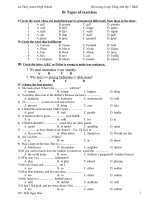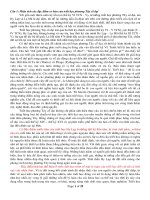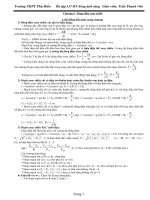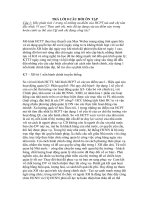Tải Ôn tập Tiếng Anh lớp 9 Unit 11 Changing Roles In Society - Bài tập Tiếng Anh lớp 9 có đáp án
Bạn đang xem bản rút gọn của tài liệu. Xem và tải ngay bản đầy đủ của tài liệu tại đây (117.22 KB, 13 trang )
<span class='text_page_counter'>(1)</span><div class='page_container' data-page=1>
<b>BÀI TẬP TIẾNG ANH LỚP 9 CHƯƠNG TRÌNH MỚI</b>
<b>UNIT 11: CHANGING ROLES IN SOCIETY</b>
<b>LANGUAGE FOCUS </b>
<b>Topic:</b>
Changing roles in society
<b>Phonetics:</b>
Agreeing and disagreeing tones
<b>Grammar:</b>
– Review: Future passive
– Non-defining relative clause
<b> Vocabulary:</b>
The changing roles in society
<b>Skills:</b>
– Reading about the changing roles of women in society and its effects
– Listening about the changes that women in Kenya are going through
– Talking and writing about roles in the future
<b>PRACTICE </b>
<b>I. Choose a word in each line that has different stress pattern.</b>
1. A. Forum B. Machine C. Pressure D. Whiteboard
</div>
<span class='text_page_counter'>(2)</span><div class='page_container' data-page=2>
4. A. Demolish B. Syllabus C. Principal D. Masterpiece
5. A. Theoretical B. International C. Uneconomic D. University
<b>II. Complete the sentences with the words from the box. Use each word once only.</b>
apply breadwinner burden content evaluator
hands-on process provider responsibility tailor
1. In our society, men are often expected to be the _________ in a family.
2. His work was reviewed by the _________ and he was given a list of corrections that he
should apply to meet corporate standards.
3. In order to help students learn the sense of _________ , it’s necessary for them to do
household work after school.
4. If you need to contact your internet service_________ , you can find their contact details
on your bills.
5. Many employers consider ________ experience to be as useful as academic
qualifications.
6. With the modern training strategy, we identify your needs, and __________ your training
accordingly.
7. He can speak English, French and Japanese. He wants a job in which he can his foreign
languages.
8. Paying tuition fees often places a large financial ___________ on poor students’ families.
9. Mary is very__________ with her current job and has no desire to quit it.
10. Teenagers play an important part in the __________ of changing the society.
<b>III. Give the correct form of the word in CAPITALS to complete each of the following</b>
<b>sentences.</b>
</div>
<span class='text_page_counter'>(3)</span><div class='page_container' data-page=3>
(PARTICIPATE)
2. Her children are very _______________. They do all the shopping and cooking by
themselves. (DEPEND)
3. In the future, students will not _____________ go to school every day; they can stay at
home and follow the lesson online.(NECESSARY)
4. The modern mother will decrease her ___________ in household work as it will be
shared by her husband.(INVOLVE)
5. Teachers should act as________, enabling their students to study in the way that suits
them best.(FACILITATE)
6. Our school will participate in a big campaign to save,_______ species.(DANGER)
7. The role of the modern teacher is to provide ________to the student.(GUIDE)
8. It is good news that all the schools in our city are_______ to changes in the curriculum.
(RESPOND)
9. Finishing high school at the age of 16 is ________possible for many students.(THEORY)
10. It is announced that successful _______will receive notification within the week.
(APPLY)
<b>IV. Put the following sentences Into passive voice.</b>
</div>
<span class='text_page_counter'>(4)</span><div class='page_container' data-page=4>
_______________________________________________
5. Teachers will not check students’ homework every day.
_______________________________________________
6. Virtual schools will allow students to work from home.
_______________________________________________
7. Will he look after the children and feed them?
_______________________________________________
8. Women will not do all the washing-up and cooking.
_______________________________________________
9. Students will log into their accounts to take part in online lessons.
_______________________________________________
10. Our school will use a special software to track student progress.
_______________________________________________
<b>V. Combine the following sentences using an appropriate relative clause.</b>
1. My head teacher has such a good sense of humour. He usually makes everyone laugh by
telling funny stories.
________________________________________________________
2. I prefer traditional classrooms. I can interact face to face with the teachers and other
students there.
</div>
<span class='text_page_counter'>(5)</span><div class='page_container' data-page=5>
4. Mr. Vinh is talking with the students. They are sharing their thoughts about the roles of
schools in the future.
________________________________________________________
5. My new school is bigger than the old one. You visited it two days ago.
________________________________________________________
6. Dr. Anna Bennett is a senior lecturer at the National University. Her paper is about
women’ s roles in the 21st century.
________________________________________________________
7. My brother has just graduated from Harvard University. Mark Zuckerberg, Facebook
founder and CEO used to study there.
________________________________________________________
8. Her husband will stay at home to look after the children. He used to be the breadwinner
of her family.
________________________________________________________
9. I have read an article about Silicon Valley. It is home to many of the world’s largest
high-tech corporations.
________________________________________________________
10. They will organise a farewell party for Ms. Jennifer Green next week. She has been our
school principal for 8 years.
________________________________________________________
<b>VI. Choose the best answer in the brackets to complete the following sentences.</b>
1. Learning in the future will be more <i>(socially-oriented/individually-oriented)</i> as each
student will have his own timetable.
</div>
<span class='text_page_counter'>(6)</span><div class='page_container' data-page=6>
3. The last <i>(interviewer / interviewee)</i> was very smart. He had answers for all of our
questions.
4. She has no sense of <i>(style / direction)</i> at all. She always gets lost.
5. This is a picture of Mountain View,<i> (where / which)</i> Google Headquarters are located.
6. I have been introduced to a student <i>(whom / that)</i> is a member of the Beyond 2030
Forum.
7. The Amazon River, <i>(that/which) </i>is in South America, is one of the longest rivers in the
world.
8. My director,<i> (whom / that)</i> you met this morning, will stop working to take care of his
children.
9. Students (<i>will stay/will be stayed</i>) at home to plan and carry out their projects.
10. Teachers (<i>will evaluate / will be evaluated</i>) in lesson planning and instructional
methods.
</div>
<span class='text_page_counter'>(7)</span><div class='page_container' data-page=7>
can manage (10) _______ their own. Men, on the other hand, feel that their position and
power in the family has been replaced by women.
1. A. Develops B. creates C. affects D. causes
2. A. Which B. who C. where D. when
3. A. Achievements B. percentages C. experiences D. advantages
4. A. Thought B. played C. shared D. took
5. A. Commercial B. industrial C. household D. academic
6. A. Challenged B. attracted C. employed D. involved
7. A. Changed B. increased C. guided D. witnessed
8. A. Because B. despite C. due D. but
9. A. Making B. doing C. getting D. working
10. A. At B. of C. on D. in
<b>VIII. Read the following passage and choose the best answer for each question.</b>
Do you ever think about what schools will be like in the future? Many people think that
students will study most regular classes such as maths, science and history online.
Students will probably be able to these subjects anywhere using a computer. What will
happen if students have problems with a subject? They might connect with a
teacher through live videoconferencing. Expert teachers from learning centres will give
students help wherever they live.
Students will still take classes in a school, too. Schools will become places for learning
social skills. Teachers will guide students in learning how to work together in getting along
with each other. They will help students with group projects both in and out of the
</div>
<span class='text_page_counter'>(8)</span><div class='page_container' data-page=8>
Volunteer work and working at local businesses will teach students important life skills
about the world they live in. This will help students become an important part of their
communities.
Some experts say it will take five years for changes to begin in schools. Some say it will
take longer. Most people agree, though, that computers will change education the way TVs
and telephones changed life for people all over the world years before.
1. What will happen if students meet difficulties with a subject?
A. Teachers from learning centres will give them help through live videoconferencing.
B. They will meet their teachers in person for help with problems with the subject.
C. They will telephone the teachers who are staying at the school to seek their help.
D. Schools will organise a live video conference for teachers to help students with
problems.
2. Students will still go to school to _____ .
A. Learn all subjects
B. Play with their friends
C. Use computers
D. Learn social skills
3. The main role of teachers in the future will be _____ .
A. Providing students with knowledge
B. Guiding students to learn computers
C. Helping students with group projects
D. Organising live video conferences
</div>
<span class='text_page_counter'>(9)</span><div class='page_container' data-page=9>
B. Taking online classes
C. Working in international businesses
D. Doing volunteer work
5. What is the main idea of the passage?
A. Kids won’t have to go to school in the future.
B. Computers will change education in the future.
C. All classes will be taught online in the future.
D. Teachers will help students from home in the future.
<b>IX. Use the words given and other words, complete the second sentence so that it has a </b>
<b>similar meaning to the first sentence. Do not change the word given. (Use 2 – 5 words </b>
<b>in total).</b>
1. My school is over 100 years old. which
I’m studying ________________________ over 100 years old.
2. Students will share their thoughts about the dream school on the forum, on
Students’ thoughts about the dream school ________________________the forum.
3. Ms. Kelly, our school principal, will attend our class this afternoon, is
Ms. Kelly, ___________________________ , will attend our class this afternoon.
4. Homework will be sent through cyberspace, through
Students _______________________ cyberspace.
5. The teacher meeting you yesterday is supervising our project, who
The teacher ____________________________ is supervising our project.
</div>
<span class='text_page_counter'>(10)</span><div class='page_container' data-page=10>
Teachers’ roles in the future:
• Instructional designer
• Trainer
• Collaborator
• Silent partner
• Coordinator
• Facilitator
________________________________________________________
________________________________________________________
________________________________________________________
________________________________________________________
________________________________________________________
<b>ANSWER KEY</b>
<b>I.</b>
1. B 2. C 3. D 4. A 5. C
<b>II.</b>
</div>
<span class='text_page_counter'>(11)</span><div class='page_container' data-page=11>
8. Responsive
9. Theoretically
10. Applicants
<b>IV.</b>
1. More forums will be opened for students to share their ideas.
2. School bags will no long be carried to the classes (by students).
3. Will students be provided with laptops or iPads / Will laptops or iPads be provided for
students?
4. Women’s contribution will be recognised and valued equally.
5. Students’ homework will not be checked every day (by teachers).
6. Students will be allowed to work from home (by virtual schools).
7. Will the children be looked after and fed (by him)?
8. All the washing-up and cooking will not be done by women.
9. Students’ accounts will be logged into to take part in online lessons.
10. A special software system will be used to track student progress (by our
school).
<b>V.</b>
1. My head teacher, who usually makes everyone laugh by telling funny stories, has such a
good sense of humour.
2. I prefer traditional classrooms where I can interact face to face with the teachers and
other students.
3. We are going to open a new English class which/ that is totally online.
</div>
<span class='text_page_counter'>(12)</span><div class='page_container' data-page=12>
5. My new school, which you visited two days ago, is bigger than the old one.
6. Dr. Anna Bennett, whose paper is about women’ s roles in the 21st century, is a senior
lecturer at the National University.
7. My brother has just graduated from Harvard University, where Mark Zuckerberg,
Facebook founder and CEO used to study.
8. Her husband, who used to be the breadwinner of her family, will stay at home to look
after the children.
9. I have read an article about Silicon Valley, which is home to many of the world’s largest
high-tech corporations.
10. Next week they will organise a farewell party for Ms. Jennifer Green, who has been our
school principal for 8 years.
<b>VI.</b>
1. Individually-oriented
2. Unemployed
3. Interviewee
4. Direction
5. Where
6. That
7. Which
8. Whom
9. Will stay
10. Will be evaluated
<b>VII.</b>
</div>
<span class='text_page_counter'>(13)</span><div class='page_container' data-page=13>
6. D 7. A 8. C 9. B 10. C
<b>VIII.</b>
1. A 2. D 3. C 4. D 5. B
<b>IX.</b>
1. At/ in a school which is
2. Will be shared on
3. Who is our school principal
4. Will send homework though
5. Who met you yesterday
<b>X. Sample</b>
The role of teachers has changed over time. It is likely that teachers in the future will be
more like facilitators, collaborators and team coordinators. Firstly, as facilitators, teachers
will help students gain knowledge more easily by discussing problems or giving them
advice rather than telling them what to do. Secondly, as collaborators, teachers will work
together with students and be involved in students’ projects. Thirdly, as coordinators,
teachers will organise different activities to ensure student’s projects work well. They will
also monitor students’ progress and assess students’ achievements. In conclusion, teachers
will not only be information providers in the future. They may act as facilitators,
collaborators and coordinators. (108 words)
Mời bạn đọc tham khảo thêm tài liệu Tiếng Anh lớp 9 tại đây:
Bài tập Tiếng Anh lớp 9 theo từng Unit: />
Bài tập Tiếng Anh lớp 9 nâng cao: />
</div>
<!--links-->









